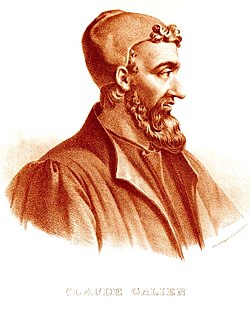Galen

Aelije Galen ili Klaudije Galen (129. – 200. n. e.), poznatiji kao Galen iz Pergama (grčki: Γαληνός, Galēnos), bio je istaknuti rimski ljekar i filozof grčkog porijekla i vjerovatno najveći medicinski naučnik rimskog doba. Njegove teorije su imale velik utjecaj na zapadnjačku medicinu duže od hiljadu godina. Njegov opis medicinske anatomije zasnivao se na majmunima, budući da seciranje ljudi nije bilo dopušteno u njegovo doba, ali ništa ga nije nadmašilo sve do štampanih opisa i ilustracija ljudske anatomije koje je napravio Andreas Vesalius 1543.[1] Galenov opis rada srca, arterija i vena održao se sve do 1628., kad je William Harvey opisao krvotok gdje je srce pogonska pumpa.[2] U 19. vijeku, studenti medicine još su čitali Galena da nauče neke pojmove. Galen je izvršio mnoge pokuse s podvezivanjem živaca da potkrijepi teoriju, koja stoji i danas, da mozak upravlja svim pokretima mišića putem središnjeg i perifernog nervnog sistema.[3] Galen je napisao kraće djelo naslovljeno "O tome da je najbolji ljekar ujedno i filozof"[4], kakvim je smatrao i sebe, što znači da je doktorsku praksu utemeljio u teoretski čvrstom znanju odnosno "filozofiji", kako se tada zvalo. Galen se jako zanimao za spor između ljekarskih škola racionalizma i empirizma,[5] a njegova primjena direktnog promatranja, anatomije i vivisekcije u ljekarskoj obuci te kao temelj za ljekarsku praksu može se smatrati kombinacijom oba pristupa i krčenjem složenijeg, istančanijeg srednjeg puta koji izbjegava nevolje svakog od njih pojedinačno.[6]
Reference
[uredi | uredi izvor]- ^ O'Malley, C., Andreas Vesalius of Brussels, 1514-1564, Berkeley: University of California Press
- ^ Furley, D, i J. Wilkie, 1984, Galen On Respiration and the Arteries, Princeton University Press, te Bylebyl, J (ur.), 1979, William Harvey and His Age, Baltimore: Johns Hopkins University Press
- ^ Frampton, M., 2008, Embodiments of Will: Anatomical and Physiological Theories of Voluntary Animal Motionfrom Greek Antiquity to the Latin Middle Ages, 400 B.C.–A.D. 1300, Saarbrücken: VDM Verlag. str. 180 - 323
- ^ Brian, P., 1979, "Galen on the ideal of the physician", South Africa Medical Journal, 52: 936-938
- ^ Frede, M. and R. Walzer, 1985, Three Treatises on the Nature of Science, Indianapolis: Hacket.
- ^ De Lacy, P., 1972, "Galen's Platonism", American Journal of Philosophy, str. 27-39, Cosans, C., 1997, “Galen’s Critique of Rationalist and Empiricist Anatomy”, Journal of the History of Biology, 30: 35-54, i Cosans, C., 1998, “The Experimental Foundations of Galen’s Teleology”, Studies in History and Philosophy of Science, 29: 63-80.
Text is available under the CC BY-SA 4.0 license; additional terms may apply.
Images, videos and audio are available under their respective licenses.

